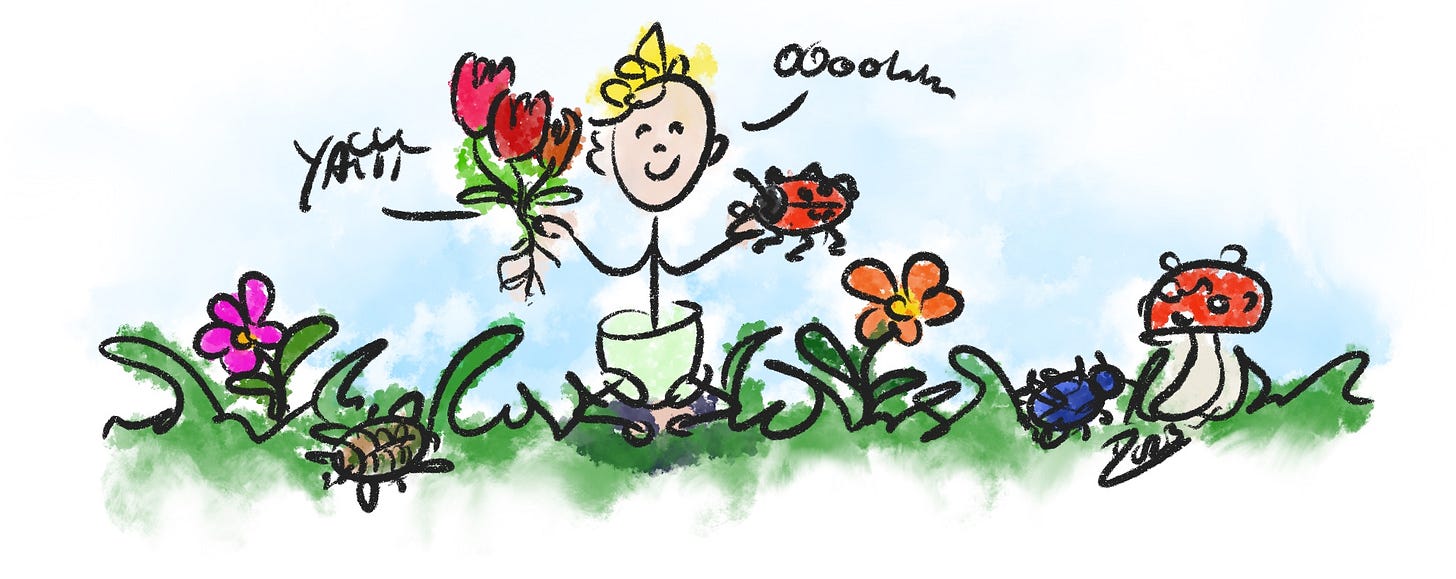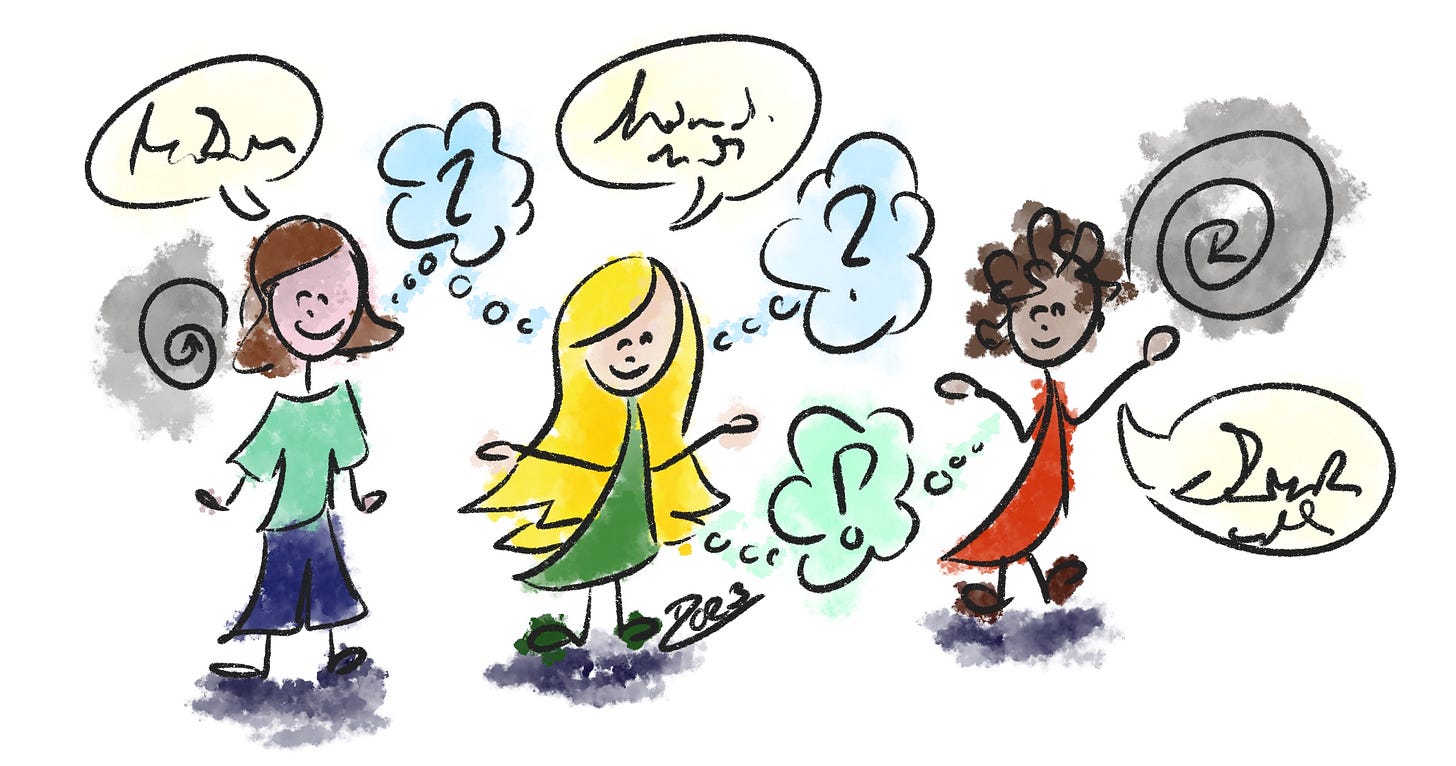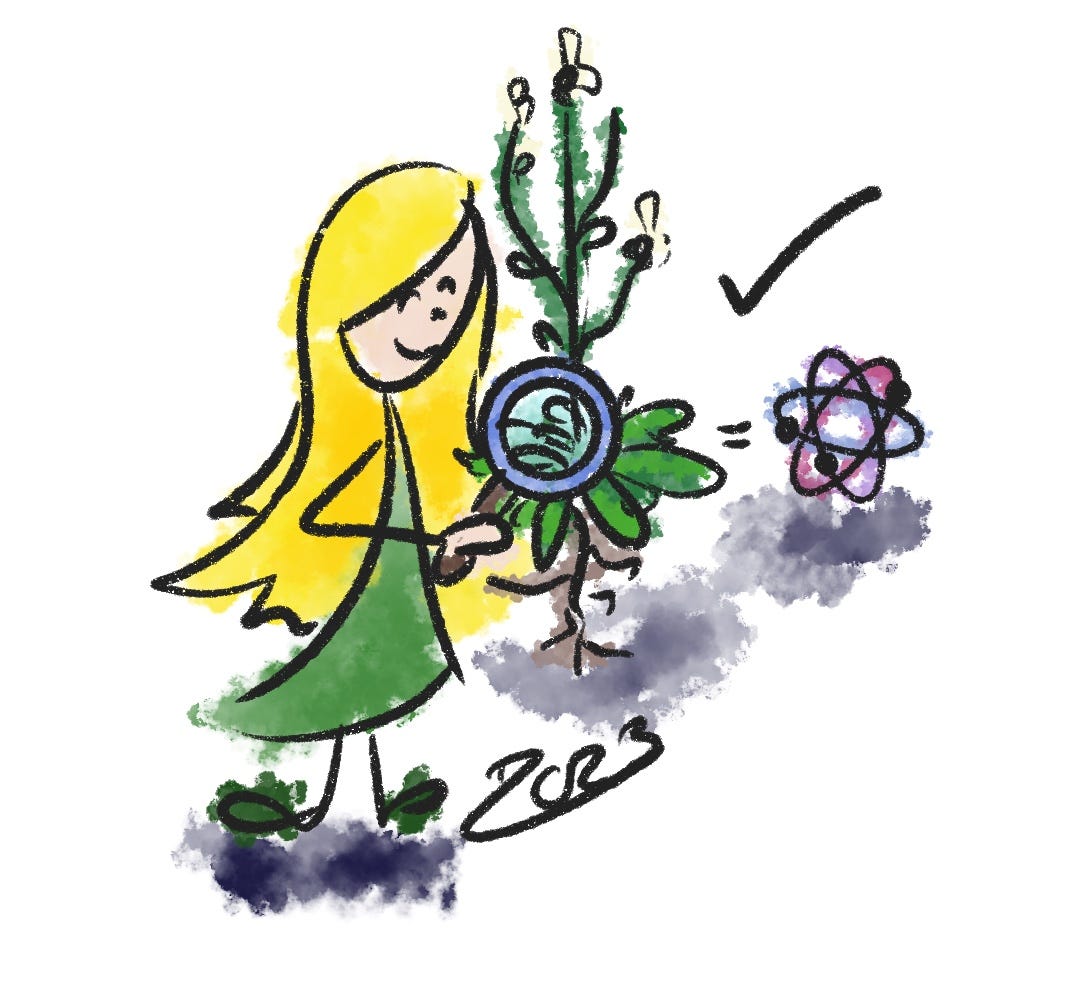This is a hat, that I consciously chose myself and this decision led me to studying biology and do my PhD in Plant Physiology. Therefore, I officially have one of the highest degrees & how a friend recently told me: “A proof that I am smart.” I personally don’t think that the PhD makes me smarter & there are different ways of being smart, but that’s for another story ;-).
And: I actually don’t believe that having a PhD in a natural science field makes you automatically be a good scientist.
Sooo the question is:
What does it actually mean to be a scientist & wear this hat?
For me personally, being a scientist is all about curiosity, it is wondering, questioning, trying to find answers and explore the world around us. On all kinds of levels, with all kinds of methods and all available senses. It’s a full-body experience.
This means to me, that every human being born on earth is a scientist from the get-go. We are actually trained-out of this innate trait of ours…
The youngest of our species are often the most curious, fearless and limitless beings there are. Most children naturally ask a lot all the time, they wonder, question, explore and learn by actively interacting with their surroundings: be it people, the blanket they lay on, animals, nature, the food they eat: everything is inspected. Depending on the developmental stage, there are different approaches that they use.
Also, depending on how we grow up, how others approach us, we either keep our curiosity & innate scientist within us, or we lose it. If I would constantly hear “Dont ask, stay quiet, it doesn’t matter…” I naturally might rather lose my curiosity. While reactions like: “Oh, that’s an interesting question, it’s because….” or “I dont know, let’s explore together!” might keep my curiosity growing and expanding with time.
I am lucky to have grown up in a family setting where curiosity was valued, sometimes my mom would have to push a little bit because I was very shy, so finding out what I wanted to do was not always easy. She always encouraged me to pursue all kinds of art classes, all hobbies I wanted & she used to say that I should do whatever I feel I like the most.
We would go for nature explorations, in the forest, to the sea, my dad would show me what is what, I was able to explore nature, plants and animals and generally speaking, I feel that I never lost my curiosity and my wonderings, to this day, being 36 years old.
You might still find me walking around and inspecting my surrounding, I will always stop for any animal that crosses my path, I will smell flowers and touch whatever I find interesting to experience it directly.
Luckily, I have many grown-ups in my life that have a similar curiosity inside them, and not all of them are studied and Phd-ed scientists. Because curiosity is essential and not only about biology, plants or human sciences, physics or chemistry, languages or history: it is about everything!
Its about asking and wondering about oneself: who am I? Why am I like that?
Or about others: Who are you? Why do you react the way you do? Why do I react the way I do when I am with you? To me, this is basic, human, scientific curiosity.
It is also about being curious to find solutions to challenges we face. Let’s say, I am stressed all the time: why is it? How can I change it? What are tools I could try? How can I explore them, in which setting, with which teacher or guide or friend?
It continues to: What do I want in my life? Why do I want it? What makes me feel joy? What are work settings that I thrive in? What are my gifts? What are aspects of myself that I could work on, so I become a better me & therefore a better coworker/friend/partner/parent etc?
This basic curiosity enhances our life, and those of others around us. If we don’t ask ourselves those questions, if we don’t self-reflect and know who we are, it is easy to get drowned into a victim-mentality, blaming others for their effects on us and become what others make of us.
Cos here is the important thing to mention: asking those curious self-reflective, scientific questions to ourselves is not egoistic either. If we are not curious about ourselves, why would we be curious about someone else? If we don’t care how we truly feel, why would we care how someone else feels?
On the opposite: if we only care about how others feel, what they do & why, and we try to comply blindly & accept all they say, do & how they behave, even though we don’t agree: we will end up being miserable.
So, not knowing our own basic value system, our morals & our boundaries will lead to a path of unhappiness.
And all that, just because we were not curious and scientific enough to ask ourselves: who am I, what do I want?
The best academic scientists that I know, are not just those who publish tons of scientific papers and are academically smart, but those that also care about other people. Those scientists who truly found their calling to be scientists AND support every person that comes along their way & care about their well-being and development.
The best academic scientists are also those, that never lost their child-like curiosity and can apply it to science and the rest of the world we live in, in the same way.
The best non-academic scientists I know are curious about life, explore all its factettes, ask and care about more than their own little bubble, without having a PhD.
The best non-academic scientists I know also have many practical skills and know many theoretical concepts and thrive experiencing life to their fullest, with an open mind, heart and soul.
I have decided to leave the academic sciences, because I felt that there is not enough of this scientific curiosity when it comes to other people, other humans & our innate human-ness.
I often asked myself: “How come plant scientists care so much about a small weed, but they don’t care about humans as biological systems & disregard their natural needs?”
For me, being a scientist is something innately present in every human being. It is also very easy to recognize whether this underlying natural, scientific curiosity is present in another human being: oftentimes, those humans have a very direct and open gaze, strong presence and groundedness, they ask a lot, they listen deeply and make others feel seen and heard.
Have you meet such curious human beings yet? And what do you think it means to wear the hat of a scientist?
Love,
Daria





